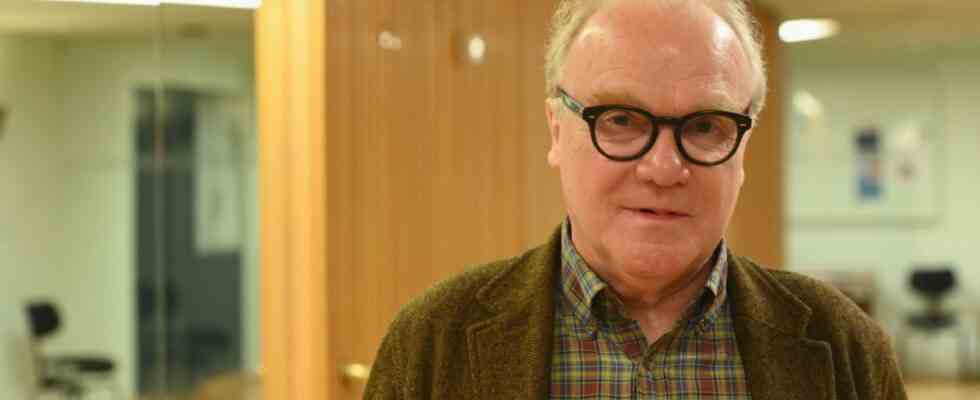Grandfather and grandson: That evokes warm, even cozy associations. Almost everyone knows examples of how this pairing, across the middle-generation divide, can create strong alliances that enrich the lives of both the elderly and the young. Grandparents have time and are energetic, and parents are more dependent than ever on the support of grandma and grandpa, who react more calmly to the rebellious phases of their grandchildren. In bourgeois relationships, all of this can intertwine harmoniously.
The story that Michael Köhlmeier tells in his new novel “Frankie” could at first glance suggest such a constellation. How far away she is from this becomes apparent in the course of an initially almost cheerful, then increasingly oppressive plot, which gives the author the opportunity to present his stylistic and artistic skills in a condensed form. Because the book manages with two hundred pages, on which (in the literal sense) an awful lot happens: It is in this respect the exact counterpart to the almost thousand-page cat epic “Matou”, with which Köhlmeier two years ago even the most well-disposed critics a little overwhelmed.
Frank Thaler, the almost fourteen-year-old first-person narrator, lives in Vienna’s fourth district with his mother, who works as a “wardrobe” at the Volksoper, which means that she is not responsible for audience coats but for singers’ costumes. The father has made off and is not missing. Frank likes to cook for his mother, to take her for a walk in the Prater on Sundays and then to watch “Tatort” in the evening. On his own, he likes to watch animal films, which are often about eating and being eaten. At school he tries to avoid conflicts, but he doesn’t make any real friends either. And it annoys him when someone Americanizes their first name to “Frankie.”
The boy lets himself be taken in by his grandfather’s cowboy-like demeanor
But that is exactly what his grandfather does, who invades the family idyll when he is released early after eighteen years in prison. He even takes it to the extreme: “Frankie Boy, ha! Little Frankie Boy!” In total, the 71-year-old has spent 26 years of his life behind bars. Why he sat remains a mystery; Judging by the sentence, it can’t have been a trifle. Frank’s mother, whose life has been overshadowed by her father’s criminal career, is correspondingly nervous and anxious: she still considers him dangerous. Frank on the other hand, out of boredom and curiosity, as he claims, is fascinated by the cowboy-like, cool demeanor of the long, thin man, whose figure the author, very visually powerful, also has a physical crooked position.
The first thing the grandfather wants to do is teach his grandson to play chess, a strategic game originally martial. And that is already a hint of the first subtle, then overt power struggle that this relationship will culminate in. The grandfather’s philosophy of life is based on an image of masculinity that is somewhere between brutal existentialism and a wild west mentality, so it certainly bears American traits.
He intends to use it to infiltrate his grandson and turn Frank into a “Frankie”. It is to his advantage that his daughter is distracted by a recent affair: she cannot prevent the senior from taking the junior out of the maternal sphere of influence or, if you will, out of the oedipal bond.
Michael Koehlmeier: Frankie. Novel. Carl Hanser Verlag, Munich 2023. 206 pages, 25 euros.
(Photo: Hanser)
So Frank, initially torn between attraction and repulsion, compassion for the old man and shock at his violent impulses, glides within a few weeks into Grandpa Ferdinand’s unscrupulous world, in which cars, often stolen, and firearms play a central role. Lo and behold, the boy, who until then had seemed precocious but also a bit conservative, is quite familiar with both. Grandfather said he was “smart” as soon as they met him, and he boldly attested to the thinking of a seventeen-year-old.
Perhaps that’s why the feeling creeps in at times that this young narrator isn’t quite right. But Michael Köhlmeier, the great specialist in fairy tales and myths, was obviously not concerned with psychological realism, but with the virtuoso description of an inner and outer crossing of a threshold. Frank’s transformation, which we experience from his own point of view, takes place with breathtaking casualness, in a setting that oscillates between coming-of-age novel, road novel and psychological thriller and still has room for comedy.
The tension is cleverly increased, the catastrophe is inevitable and of almost ancient proportions, but the details remain as vague as much of this narrow, very artistic piece of literature. A bravura performance, no doubt, which can, however, darken the mind – because there is no counter-proposal to the decision for evil. In any case, “Frankie” should not be misunderstood as a young adult book.

